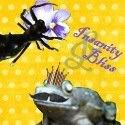"You either live life, bruises, skinned-knees and all, or you turn your back on it, and start dying."
--Captain Pike, in the country illusion
--Captain Pike, in the country illusion
It's no secret I'm in love with Spock. If able, or required, to marry a fictional character, Spock would be the first to come to mind. Spock's presence (not yet Dr.) in The Cage, the pilot originally intended by Gene Roddenberry to start the series, might be one of the high points of the episode, along with the presence of Mrs. Roddenberry herself (then still Majel Barrett, not yet married to Roddenberry) as Number One. Which isn't to say the episode itself isn't worth watching. I just get a lot of satisfaction over spending time with my beloved, even if his eyebrows look untended (cheap costume budget), and he hasn't yet earned his degree.
Episode Background
Whether to begin with "The Cage", or the pilot episode NBC demanded start the series, was a genuine dilemma. Originally, I'd intended to work my way through the universe on the basis of when material became available to the broader viewing public. But, I decided that the more appropriate consideration was to get a peek at what Roddenberry himself had intended.
Roddenberry originally marketed his idea for the series as a kind of Wagon Train in the Stars, though his intention was to write a fabulous science fiction action adventure that delivered moral insight. Cowboy movies, as my family called them, were quite popular at the time, and Roddenberry thought he could take advantage of such interest by promoting his series as a variation on the theme.
Writing "The Cage" as his original pilot, Roddenberry intended to explore psychological complexities, not to mention gender dynamics interesting for the time, with the series. NBC rejected the episode as too intellectual, and required a new pilot be written. The second pilot "Where No Man Has Gone Before" relied on the strength of the western genre being written by a well-established westerns writer of the time, Samuel Peeples.
Episode Plot Quick-Summary
Captain Pike and his crew, led by Number One, and Mister Spock, intercept a distress signal from a planet capable of sustaining human life. Captain Pike resists rescuing people when it is unlikely they even survived the crash. However, a scan of the planet reveals there are actual life signs. The ship diverts its route and goes to investigate the survivors. After finding the camp where the survivors have made due for at least two decades, the crew realize a beautiful, young woman, Vina, was born shortly after the crash and has been raised there on the surface without any other humans her own age (that is, without anyone to be attracted to). The attraction between Vina and Captain Pike is obvious. It turns out, however, that this attraction is exactly what lures Captain Pike into being kidnapped by an intellectually advanced, and telepathic people quite capable of projecting the power of illusion around and into their captives.
Episode Specimens
The episode offers interesting wisdom for our internet addicted, video game attached generations. "The Cage" wants to teach us, among other things, that over-attention to our imaginative or intellectual drives too easily causes us to neglect our other needs. We get pulled too strongly into a world of illusion, neglecting, then, our own real lives. Interestingly it would seem that Roddenberry compels us to not involve ourselves too much in his own medium--moving pictures and stories. Such things take us away from involvement in the activity of our own everyday lives. In writing "The Cage" and developing Star Trek, Roddenberry clearly believes we can learn, however, from the narrative guidance offered by a well-written and morally guiding illusion. Real life and illusion, then, would seem to have a potential for balanced co-existence in our lives.
Episode Details
Captain Pike is tempted by a beautiful "green animal woman", as the episode's Doctor calls them. According to the dialogue of "The Cage" itself, she represents a woman that likes being taken advantage of, a woman that simply wants a man to want her. As those of us that have seen the 2009 movie Star Trek know, the young Kirk is caught in a sexual situation with a green-skinned woman early in the film. Kirk does want her in that moment, at least as simple sexual relief. As the movie continues, Kirk easily leaves her behind. In "The Cage" too, though Captain Pike is attracted to the green-skinned woman for sexual reasons, he resists her. Sexual desires are not enough. The sophisticated man wants a sophisticated woman. The Star Trek universe, it would seem, offers a moral lesson that to be a desirable woman, a woman must be more than just wanting of a man's desires for her.
There is a wonderful irony when Majel Barrett, Number One, is beamed down to potentially breed with Captain Pike. Vina looks at her, disgusted with the idea that other women might breed with Captain Pike before she can, and announces to Number One, "He'd have more luck crossing him with a computer." Majel Barrett-Roddenberry, of course, eventually does become the voice of the Enterprise computer.








4 comments:
The thing is, Spock never did become "Dr." of any form in the Star Trek universe. It's only my universe that he apparently does. If I could offer some skewed explanation by way of pre-apology, I might say that I've been worried about the writing I'm in the midst of to complete my degree, and so have academic labels on the brain, and some how imposed that in the place of Spock's lack of obvious crew title in this episode. As Star Trek develops Spock is known as The First Officer, then, much later on he becomes Captain, and in the most recent movie he's Ambassador. In "The Cage" we meet Spock without a crew title pretense. It's in the absence of this that I'm simply grateful to see him. He's the one main character that continues on in the Star Trek universe. Please excuse the obvious mistake I make in this post.
Probably got it confused with Dr. Spock, the real-life baby doctor who was a popular figure of the time.
no. that wasn't it. it's that later he is touted as *ambassador* spock (i honestly love his older self best), and i translated that into an academic model, which would be like *dr.*
I really enjoyed the background info on what NBC wanted and what Roddenberry wanted, especially since I think NBC makes most of its decisions these days by spinning around until they are dizzy and throwing darts out a window onto balloons sitting on the ground with REALLY BAD CHOICES in them...but I digress...
Interesting how the simple sexual desire is just an illusion of the deeper need for real life intimacy and interaction as well. Green makes me think of "green light, go!" like, there is no reason stop that train, but morality and decency step in...
I will enjoy finding out more about Spock and the allure he holds for you; I am sure it is totally logical! (I am a dork)
Post a Comment